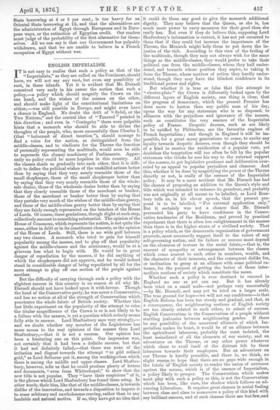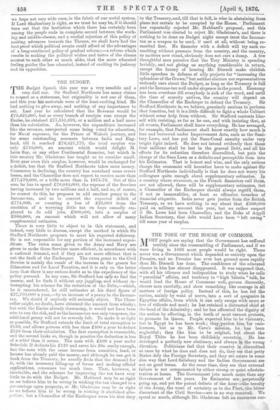danger of repudiation by the masses, if he did anything
of which come nearest to each other in numbers, wealth, and which the shopkeepers did not approve, and he would indeed the character of their interests, and the consequent dislike for, stand in considerable danger of being repudiated by all for the or inclination to grasp at an alliance with some political ex- mere attempt to play off one section of the people against treme, for the purpose of getting the better of those inter- another, mediate sections of society which constitute the mean.
slightest success in this country is no reason at all why Mr. England no one as yet can say. But it has already Disraeli should not have looked upon it with favour. Though been tried on a small scale—not perhaps very successfully the head of the Conservative party, he was never a Conservative, —by Mr. Disraeli, and may yet be tried on a larger scale. and has no notion at all of the strength of Conservatism which The true ground for hope—we will not say confidence—is that penetrates the whole fabric of British society. Whether this English Reform has been too steady and gradual, and that, as last little,experiraent on the popularity of the attempt to raise a consequence, the neighbouring sections of English society the titular magnificence of the Crown is or is not likely to be are too closely related to each other, to admit of success. a failure with the masses, is yet a question which nobody seems English Conservatism is the Conservatism of a people without fully able to answer. Lord Shaftesbury says very strongly,— startling jealousies between neighbouring grades. If there and we doubt whether any member of the Legislature has be any possibility of the unnatural alliances of which lm- more access to the real opinions of the masses than Lord perialism makes its boast, it would be of an alliance between Shaftesbury,—that it is not a success. Our opinion has the agricultural labourers, probably the most isolated, the been a hesitating one on this point. Our impression was, least assimilated of all the elements of our society, and an not certainly that it had been a definite success, but that adventurer on the Throne, or any other power whatever it had not definitely failed,—that there was none of the which chose to avail itself of the distrust felt by these irritation and disgust towards the attempt "to gild refined labourers towards their employers. But an adventurer on gold," as Lord Selborne put it, among the working-class which our Throne is hardly posssible, and there is, we think, no there is among the middle and upper classes. Lord Shaftes- slight reason to hope that there are no gaps wide enough in bury, however, tells us that he could produce plenty of letters the fabric of English society to render the union of extremes and documents, "even from Whitechapel," to show that the against the means, which is of the essence of Imperialism, new title is not popular. They "have their suspicions" of it, a policy likely to prosper. The Conservatism which makes is the phrase which Lord Shaftesbury has found them using. In most play with such a policy as this, is not the Conservatism other words, their bias, like that of the middle-classes, is towards which has been, like ours, the shadow which follows on ad- dislike of the innovation, and towards a disposition to impute it vancing Liberalism. It requires great chasms in social feeling to some arbitrary and unwholesome craving, rather than to any between class and class to manceuvre a policy of this kind with laudable and natural motive. If so, they have got no idea that any brilliant success, and of such chasms there are but few, and State borrowing at 4 or 5 per cent., is too heavy for an it could do them any good to give the monarch additional Oriental State borrowing at 13, and that the alternatives are dignity. They may believe that the Queen, as she is, has the administration of Egypt through Europeans and in Euro- much more power to carry measures for their good than she peen ways, or the extinction of Egyptian credit. Our readers really has. But even if they do believe this, supposing Lord must judge of the probability of the first alternative for them- Shaftesbury's information is correct, it has not yet occurred to selves. All we can say is that our Government has palpably them that if they could but increase the importance of the withdrawn, and that we are unable to believe in a French Throne, the Monarch might help them to put down the in- occupation of Egypt without war. justice of the rich. According to this view of the feeling of the multitude, though they may not always wish for the same things as the middle-classes they would prefer to take their
ENGLISH IMPERIALISM. political cue Irom the middle-classes, whom they half under- TT is not easy to realise that such a policy as that of the stand, and towards whose position they aspire, to taking it .I. not as they are called on the Continent, should from the Throne, whose motives of action they hardly under- have, we will not say any root, but even any possibility of stand, though they may have the blindest confidence in its root, in these islands. Yet it is evident that Mr. Disraeli traditional power and rights. conceived very early in his career the notion that such a But whether it is true or false that this attempt to policy,—a policy which should magnify the Crown on the " electro-plate " the Crown is differently looked upon by the one hand, and the wishes of the masses on the other, different layers of English society, one thing is clear, that and should make light of the constitutional limitations on the progress of democracy, which the present Premier has either,—was still possible in Europe, and might even have done more to hasten than any public man of his day, a chance in England. No doubt the drift of 44 Sybil, or the opens the way for any statesman who is so disposed, to Two Nations," and the central idea of " Tancred " pointed in alliances with the prejudices and ignorance of the masses, this direction ; and even in " Coningsby " there were palpable such as constitutes the very essence of the Imperialist hints that a monarch who should be able to divine the policy of France. Despotic decrees, such as are likely thoughts of the people, who, more successfully than Charles L to be ratified by Plebiscites, are the favourite engines of (that " holocaust of direct taxation "), should manage to French Imperialism ; and though in England it will be lin- find a voice for the nation, as distinguished from the possible, for a great many generations to come, to excite any middle-classes, and to vindicate for the Throne the function loyalty towards despotic decrees, even though they should be of personally representing the multitude, would soon be able of a kind to receive the ratification of a popular vote, yet to supersede the clumsy machinery of Parliaments. Appar- doubtless the temptation will too often be felt by the popular ently no policy could be more hopeless in this country. All statesman who thinks he sees his way to the external support the classes shade so gradually into each other, that it is diffi- of the masses, to get legislative prudence and deliberation over- cult to define the political wishes of the unskilled artisan better ruled by an appeal to popular prejudices and clamour. And than by saying that they very nearly resemble those of the this, whether it be done by magnifying the power of the Throne small shopkeeper, those of the small shopkeeper better than directly or not, is really of the essence of the Imperialist by saying that they very nearly resemble those of the whole- policy. It may be a mere accident that Mr. Disraeli has had sale dealer, those of the wholesale dealer better than by saying the chance of proposing an addition to the Queen's style and that they Closely resemble those of the merchant or banker, title which was intended to enhance its grandeur, and probably those of the merchant or banker better than by saying that was not originally at all meant to be labelled, as Lord Rose- they partake very much of the wishes of the middle-class gentry, bery tells us, in his clever speech, that the present pro- and those of the middle-class gentry better than by saying that posal is to be labelled, "For external application only." they are fairly enough represented on the benches of the House But it certainly was not a chance that Mr. Disraeli of Lords. Of course, these gradations, though slight at each step, persuaded his party to have confidence in the Conser- collectively amount to something substantial The opinion of the votive tendencies of the Residuum, and proved by practical House of Commons, which represents the nation, is not quite the experiment that there is often less enlightenment in the masses same, either in drift or in its constituent elements, as the opinion than there is in the higher strata of a civilised society. That of the House of Lords. Still, there is no wide gulf between is a policy which, as the democratic organisation of government any two classes. A monarch who tried to gain for himself proceeds, must necessarily suggest itself to the rulers of any popularity among the masses, and to play off that popularity sell-governing nation, and its failure or success must depend against the middle-classes and the aristocracy, would be at a on the closeness of texture in the social fabric,—that is, the grievous loss what to begin with. He would be in great amount of sympathy or estrangement between the classes
But the difficulty of carrying through such a policy with the Whether such a policy is ever destined to succeed in we hope not very wide ones, in the fabric of our social system. If Lord Shaftesbury is right, as we trust he may be, if it should turn out that the hesitation which there has certainly been among the people ends in complete accord between the work- ing and middle-classes, and a cordial rejection of this policy of making advances towards the Throne, we shall have had the best proof which political events could afford of the advantages of a long-continued policy of gradual reform ;—a reform which results in making the political wishes and tastes of the classes nearest to each other so much alike, that the more educated feeling guides the less educated, instead of exciting its jealousy and its opposition.



































 Previous page
Previous page